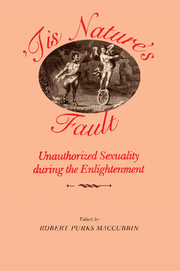Book contents
- Frontmatter
- Contents
- Introduction
- “The Secrets of Generation Display'd”: Aristotle's Master-piece in Eighteenth-Century England
- Sexual Imagination as Revealed in the Traité des superstitions of Abbé Jean-Baptiste Thiers
- Married but not Churched: Plebeian Sexual Relations and Marital Nonconformity in Eighteenth-Century Britain
- Moral Values in “La Suite de l'Entretien”
- Prostitution and Reform in Eighteenth-Century England
- The Properties of Libertinism
- Between the Licit and the Illicit: the Sexuality of the King
- The Sublimations of a Fetishist: Restif de la Bretonne (1734-1806)
- Sodomitical Subcultures, Sodomitical Roles, and the Gender Revolution of the Eighteenth Century: The Recent Historiography
- The Priest, the Philosopher, and Homosexuality in Enlightenment France
- The Pursuit of Homosexuality in the Eighteenth Century: “Utterly Confused Category” and/or Rich Repository?
- Sodomy in the Dutch Republic during the Eighteenth Century
- Parisian Homosexuals Create a Lifestyle, 1700-1750: The Police Archives
- The Censor Censured: Expurgating Memoirs of a Woman of Pleasure
- Chthonic and Pelagic Metaphorization in Eighteenth-Century English Erotica
- Modes of Discourse and the Language of Sexual Reference in Eighteenth-Century French Fiction
- The Mélange de poésies diverses (1781) and the Diffusion of Manuscript Pornography in Eighteenth-Century France
- Obscene Literature in Eighteenth-Century Italy: an Historical and Bibliographical Note
Between the Licit and the Illicit: the Sexuality of the King
Published online by Cambridge University Press: 06 July 2010
- Frontmatter
- Contents
- Introduction
- “The Secrets of Generation Display'd”: Aristotle's Master-piece in Eighteenth-Century England
- Sexual Imagination as Revealed in the Traité des superstitions of Abbé Jean-Baptiste Thiers
- Married but not Churched: Plebeian Sexual Relations and Marital Nonconformity in Eighteenth-Century Britain
- Moral Values in “La Suite de l'Entretien”
- Prostitution and Reform in Eighteenth-Century England
- The Properties of Libertinism
- Between the Licit and the Illicit: the Sexuality of the King
- The Sublimations of a Fetishist: Restif de la Bretonne (1734-1806)
- Sodomitical Subcultures, Sodomitical Roles, and the Gender Revolution of the Eighteenth Century: The Recent Historiography
- The Priest, the Philosopher, and Homosexuality in Enlightenment France
- The Pursuit of Homosexuality in the Eighteenth Century: “Utterly Confused Category” and/or Rich Repository?
- Sodomy in the Dutch Republic during the Eighteenth Century
- Parisian Homosexuals Create a Lifestyle, 1700-1750: The Police Archives
- The Censor Censured: Expurgating Memoirs of a Woman of Pleasure
- Chthonic and Pelagic Metaphorization in Eighteenth-Century English Erotica
- Modes of Discourse and the Language of Sexual Reference in Eighteenth-Century French Fiction
- The Mélange de poésies diverses (1781) and the Diffusion of Manuscript Pornography in Eighteenth-Century France
- Obscene Literature in Eighteenth-Century Italy: an Historical and Bibliographical Note
Summary
More deadly than armaments, Licentiousness has engulfed us in vengeance for the conquered world.
(Juvenal, Satire 6, 11. 292-93)At eleven o'clock on 21 January 1793, in a silence heavy with fear mixed with hatred, awe, and horror, the head of Louis XVI fell severed on the Place de la Révolution—one of those complex historical events whose implications and consequences are given deep and systematic study, but all too often from a narrow perspective. The historical significance of the king's execution has thus been long debated from countless points of view, yet there may be factors still to be analysed, especially from our newer vantage of historical psychology.
I propose to focus on the metamorphoses undergone by the image of the king in order to understand how his executioners and jailers could dare lay hands on the Lord's anointed. How, since the advent of Louis XV, could public opinion have turned about so radically from reverential adulation to bitter contempt? Most historians have attributed this to the faults and incapacities of Louis XVI, Marie-Antoinette, and their entourage, even to the diminished magnificence of his court and to his relatively modest style of life; yet we might better look back to the much longer reign of Louis XV for the causes of the people's disenchantment with the monarchy.
The increased burden of taxation along with the repeated military and diplomatic setbacks of his reign were, no doubt, important factors, though France had never been more prosperous.
- Type
- Chapter
- Information
- 'Tis Nature's FaultUnauthorized Sexuality during the Enlightenment, pp. 88 - 97Publisher: Cambridge University PressPrint publication year: 1988
- 1
- Cited by



